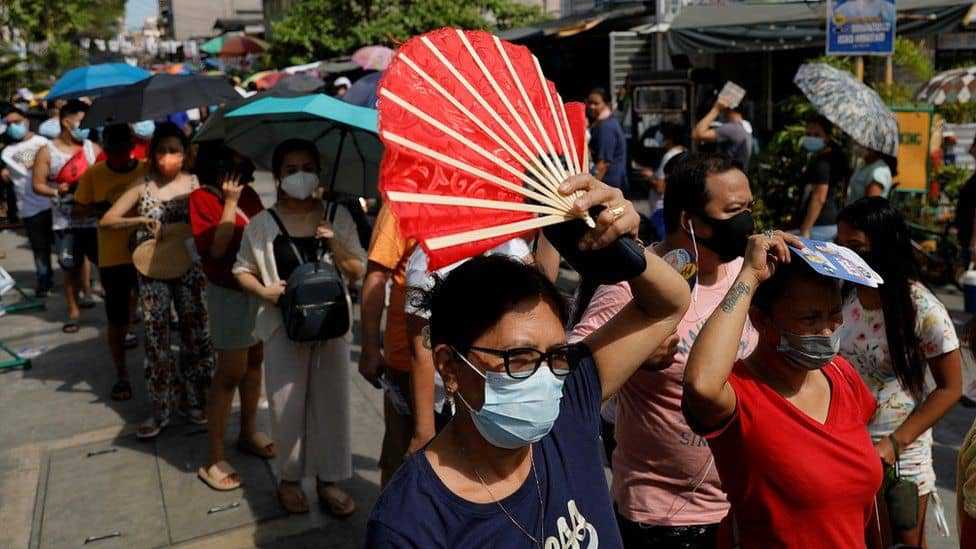Philippines election: Marcos family eye return to power as country votes
09 May, 2022

Voting is under way in the Philippines, with millions queuing across the islands to choose their next president.
The man tipped to win the presidency is Ferdinand "Bongbong" Marcos Jr, the son of the nation's former dictator.
Polls suggest he may see a landslide victory, meaning the Marcos clan ousted by a people's revolt 36 years ago could reclaim power.
His main rival is Leni Robredo, a liberal who narrowly beat Mr Marcos in the 2016 vice-presidential race.
But polls this campaign have consistently shown the Marcos heir ahead with a commanding 30-percentage-point lead.
A high turnout is expected of the nation's eligible 67.5 million voters - with many lining up pre-dawn on Monday to cast their votes at polling booths at schools and community centres. There have been reports of ballot issues, with some voters at a school in Manila telling the BBC they were having trouble feeding their papers into the counting machines. Others reported that they were told to leave their votes with booth officials.
Local news site the Inquirer said over 1,800 machines - out of tens of thousands- had malfunctioned in the morning, but these had been "resolved" by midday according to the electoral commission.
Comelec Commissioner George Garcia had earlier told the BBC "there will always be allegations of irregularities" but there were no significant breaches so far.
He also said reports of violence were "minimal" and "the police are in full control of the situation".
On Sunday, a grenade attack outside a polling station in the volatile Mindanao region left nine people injured, said police, according to an AFP report.
Whoever wins Monday's presidential race will take over from Rodrigo Duterte, a hardliner who's come to the end of his six year term in office.
Mr Duterte's government has been condemned for its brutality in cracking down on drugs and crime, though the administration has always rejected allegations of wrongdoing.
Critics also say democratic institutions have come under attack in his presidency, pointing to the shutdown of Philippines' broadcaster ABS-CBN, a channel which - like other some other independent media outlets - has angered Mr Duterte in the past.
Who are the candidates?
Bongbong Marcos, 64, is the son of the late dictator Ferdinand Marcos whose regime lasted 21 years.
On Monday, he and his family - including his mother Imelda - cast their votes at a school polling booth in Batac in the country's north, his family's heartland.
Ferdinand Marcos' rule saw him plunge the country into martial law and take control of the country's courts, businesses and media. The army and police arrested and tortured thousands of dissidents and political opponents were murdered.
Mr Marcos, his wife Imelda - infamous for her lavish designer wardrobe - and their cronies plundered an estimated $10bn (£8.1bn) from public funds. Public anger over his regime saw him forced out in the People's Power Revolution of 1986 and he died soon afterwards.
Upon his family's return from exile in the 1990s, Bongbong used his family's wealth and connections to resume political ambitions, becoming a province governor, congressman and senator.
When he lost the 2016 vice-presidential race to Ms Robredo, he contested the result - and has vowed that he won't be "cheated" this time around.
His running mate is Sara Duterte, daughter of the incumbent president. The pair have promised to "unify" the nation but they rarely discussed any policies during their election rallies.
Ms Robredo is a former human rights lawyer who has consistently led campaigns against Duterte's drugs violence and gender inequality.
She has vowed to tackle corruption, with her campaign slogan being: "Honest government, a better life for all".
Her rallies have drawn significant turnouts recently - particularly among engaged, generally young "Pink Shirt" supporters who launched door-knocking campaigns to win her votes.
The other candidates have trailed Marcos and Robredo in polls. They include boxing champion and national hero Manny Pacquiao who has promised to tackle corruption and poverty, and Manila's city mayor Isko Moreno who has promised infrastructure spend and a harsher line on China.
Are there any electoral concerns?
Critics say the election has been plagued by rampant misinformation on social media.
"I have described it as a cesspool of disinformation and it just gets worse every election cycle," Richard Heydarian, a politics professor at Polytechnic University of the Philippines told the BBC.
Bongbong has denied accusations that he's launched online operations to whitewash his family's history. However, his campaign consistently paints his father's dictatorship as a false "golden period" for the country - despite widespread poverty and an economy heavily indebted to foreign banks.
He has also steered clear of debates or forums where he might have to face independent questioning.
For Ms Robredo, tracker groups have reported an escalation in online campaigns harassing and vilifying her with misogynistic messages.
The Asian Network for Free Elections - a monitor - has found past Philippines votes to be generally free and fair.
When might we expect results?
Polls will remain open until 19:00 (1100 GMT) locally, although this may be extended for Covid restrictions and if voters are still waiting in line. Many are wearing masks to the polls.
Filipinos are not only voting on the president but also the vice-president, senators, lower house legislators and thousands of lower-ranking officials across the whole archipelago's 7,600 islands.
A turn-out of about 80% - as seen in previous elections - is expected.
Counting will start the moment polls close and it may become clear in a few hours which candidates are pulling ahead. However the process could also take days before a winner is announced, as was the case in 2016.
Source: www.bbc.com
TAG(s):
